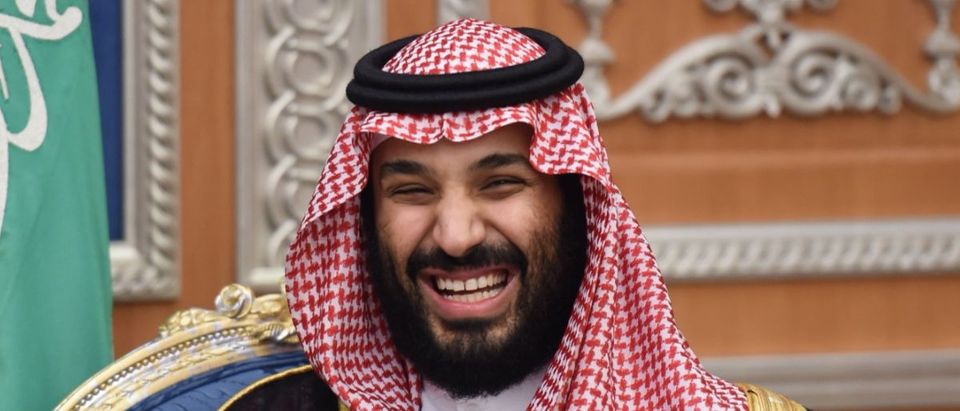In his first visit ever to the United States, Saudi Arabia’s Crown Prince Mohammed bin Salman, (commonly called MBS) started with interview on “60 Minutes,” continued in Washington with a meeting and state dinner with the president of the United States, and then a follow-on dinner with the vice president. Subsequently, his week-long visit will culminate with a trip to Silicon Valley, Texas and Wall Street.
What is he up to? Something very serious and potentially highly beneficial to the United States. He wants to radically transform his country, and as Ahmed Charai, the chairman of Global Media Holdings explains, the new Saudi ‘Vision 2030’ is the “biggest planned change in any country since Turkey’s Ataturk or Singapore’s Lee Kuan Yew. With America’s encouragement, Saudi Arabia could lead a regional transformation that would be truly historic.”
The Kingdom under the leadership of MBS is undertaking four key reforms and policy initiatives.
First, while the Saudis understand their country is often thought of the home of 17 of the September 11 hijackers, the Kingdom is moving to help the US in dealing with the terrorist realities of our time. Again, according to Charai, “Regarding the war on terror, Saudi Arabia has been one of America’s most steadfast allies. Since the September 11 attacks, it has killed or captured hundreds of al Qaeda operatives and provided intelligence on thousands more. It has cracked down hard on sheikhs who once financed terror outfits, seized bank accounts and jailed malefactors.”
Almost every terror group in the region gets its funding and inspiration from the Muslim Brotherhood. And in a bold and possibly dangerous move, the Prince is kicking the Muslim Brotherhood out of leadership positions in the Saudi schools and universities.
Second, MBS is reforming the culture. After the 1979 attacks on the shrines at Mecca and Medina, the Saudi government banned women from driving cars, shuttered movie theaters, and allowed the radical Muslim clergy to run the schools and the culture. They assumed the adoption of a harsh Sharia law would make the radicals behind the attacks stand down.
That policy is ending.
The reform of allowing women to drive is symbolic — ending harsh rules — but also practical. Already 70,000 Saudi women have signed up for driving school. The domestic reforms have been far more rapid than seen before. And one hoped-for result: joining Jihad will no longer be attractive for a population half of whom are under 35.
Third, MBS is the first Saudi leader to venture outside of Washington and visit our financial and technology centers to encourage investment in the Saudi oil industry.
The Kingdom is seeking to transform its economy from an oil-centric, one-income source nation, to a modern and diversified economy. It is planning to build 18 new nuclear power plants as well.
This has profound economic implications—all of our most serious economic recessions over the past half-century have come directly out of dramatic spikes in the price of oil. With the Kingdom no longer benefiting from dramatic spikes in oil prices, disruptions and consequent recessions can hopefully be swept into the dustbin of the past.
The Kingdom is also cracking down on internal corruption and the loss of billions annually in oil revenue. This will get their economic books in order to help, in part, initiate $200 billion in investments in the United States, rising to $400bn over a ten-year window.
Fourth, the Saudis are helping to fight an Iranian funded and armed terror group, the Houthis, who are trying to grab the strategically important country of Yemen. The oil routes from the Gulf lie right along the coasts of Yemen, from which Iran could disrupt the industrial economies of the world.
Iran scholar Ken Timmerman explains, the Houthis have fired Iranian-supplied missiles at the Saudi capital, Riyadh. They have targeted civilian airports, forcibly recruited child fighters and used scorched earth tactics to control territory.
Since 2015, the United States has assisted the Saudis and their allies in Yemen. American support began in 2015 and takes the form of intelligence sharing, military advice and logistical support, including air-to-air refueling. American support is focused considerably on reducing civilian casualties.
“From my perspective, it is better for us to stay engaged with them and continue to influence,” said Gen. Joseph Votel, head of U.S. Central Command.
A Senate resolution to withdraw all US troops from the conflict recently came up for a vote, and by a vote of 45-55, it failed.
Couple these initiatives with the already strong U.S. alliance with Israel, and the improved alliance with Egypt, and the United States and its allies will have the capability to challenge Iran’s hegemonic ambitions in the Gulf and the larger Middle East.
That, in turn, will allow the United States and its allies to deal with the Iranian nuclear agreement, the 2015 Joint Comprehensive Program of Action that eliminates the sunset clauses in the deal, while also reigning in Iranian missile production and terrorist support.
Critical to that effort will be to secure for the future of the region an Iran that no longer threatens with its missiles and a future nuclear arsenal, and thus allows peace, prosperity and security to grow apace.
An alliance with the Saudi Kingdom that moves in that direction will indeed transform the region and with it the long-term relationship between our two countries.
Peter Huessy is president of his own defense consulting firm, GeoStrategic Analysis, founded in 1981, and was the senior defense consultant at the National Defense University Foundation for 22 years.
The views and opinions expressed in this commentary are those of the author and do not reflect the official position of The Daily Caller.


